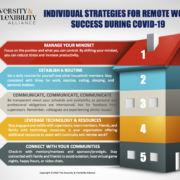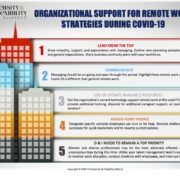Do You Have What You Need In Your Remote Working Toolkit?
This article was published April 16, 2020 in THRIVE GLOBAL.
By Manar Morales, President & CEO, The Diversity & Flexibility Alliance
There’s no doubt we’re living through one of the darkest and most uncertain times in modern history. We’re anxious and overwhelmed by the news of so many people affected by COVID-19 and the corresponding financial damage. However, many of us are fortunate to be able to work from home as we shelter in place and distance ourselves from others. In the midst of so much heartache and chaos, we’re grateful to maintain our professional responsibilities, continue to receive a paycheck and stay home safe with our families.
Ultimately, it’s this gratitude that will help us through this struggle and is critical to remote working success during the pandemic. The most important tool in your crisis-mandated remote working toolkit is mindset. We may not be able to control the chaos around us, but we can control our mindset and outlook. It’s essential to train your mind to focus on what you’re grateful for and what’s going well. Once you’ve focused on the positives, other strategies critical to your remote working toolkit include:
Routine
Create a routine that works for you, your colleagues, and your family. Wake up at the same time and identify blocks of time when you can work most effectively (i.e. early in the morning, late at night, or when the kids are doing online schoolwork). Make sure to communicate these and any changes in timeframes with your team.
Space
Finding a quiet space where you can focus solely on your work will help you transition from your personal responsibilities to your professional obligations. Even without a dedicated home office space, a quiet corner will help you maintain focus and productivity.
Communication
While in person meetings are restricted, virtual and written communication should be increased. Be proactive; outreach to your supervisor and colleagues and make sure to communicate when you’re available for calls and video chats. Provide email updates on projects and express realistic expectations and deadlines. Some projects may be temporarily shifted to the back burner and others will become priorities.
Support
Seek out resources if you need training on new technology or if you need mental health support. Turn to your employee resource group or affinity group for support and connect with peers, mentors, and sponsors. Provide and solicit feedback on how things are going; be open to solving challenges with colleagues during this unique and difficult time.
Self-Care
It’s important to take care of yourself both mentally and physically, especially during times of crisis. Take a walk or engage in some kind of physical activity each day. Try to maintain healthy eating habits and reach out to friends regularly.
Flexibility
In a recent article I explained how important it is for business leaders to be optimistic, empathetic, and realistic as they weather the challenges of maintaining business continuity during this crisis. It really boils down to everyone being flexible. Dogs will be barking and kids will be heard during phone calls. You may not always be prepared to be on a video call, and that’s OK. It’s really up to all of us to come together, be flexible, and do our best right now.
In time, we’ll return to our physical offices. But in the meantime, care for your families, lean on your friends and co-workers, and rely on these success strategies in your remote working toolkit.
We are here to help you navigate your crisis-mandated telecommuting plan. Please contact Manar Morales to schedule a complimentary call today.






